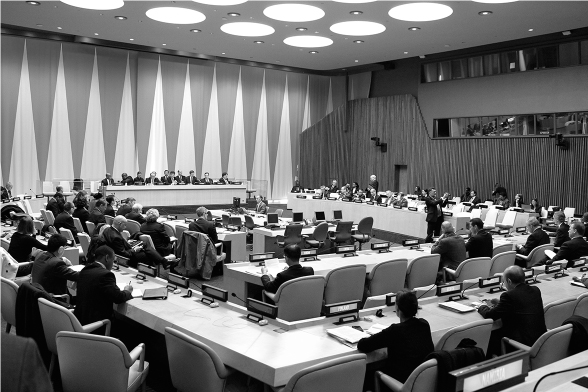
The Economic and Social Council may make or initiate studies and reports with respect to international economic, social, cultural, educational, health, and related matters and may make recommendations with respect to any such matters to the General Assembly, to the Members of the United Nations, and to the specialized agencies concerned.
—UN Charter
The Economic and Social Council, or ECOSOC, established as a principal organ of the UN, is one of those organizations that may work better on paper than in practice. It was intended to function as a forum for discussing international social, economic, and humanitarian issues, as well as to coordinate the work of UN agencies and bodies concerned with those issues. As part of its coordinating role, ECOSOC commissions studies, writes reports, and makes policy recommendations to the General Assembly and other parts of the UN on a wide range of issues, from rights to international finance. The Charter also authorizes it to draft General Assembly resolutions and even to convene conferences. Every spring, for example, it hosts a high-level conference of the Bretton Woods Institutions (the World Bank and the International Monetary Fund), the World Trade Organization (WTO), and the UN Conference on Trade and Development (UNCTAD) focused on international finance and development.
Perhaps because its mission is so broad it has struggled to define a clear identity and has been accused of a lack of focus. Insiders have remarked on ECOSOC’s talent for fostering debate that leads to little apparent action. Some diplomats, like Canadian David Malone, have found the organization’s fuzziness and long discussions hard to endure. This has spawned recommendations for reworking the body, some of which have been adopted, including a full-time move to New York. Under the previous confusing arrangement it alternated between New York and Geneva.
Despite the criticisms, membership in ECOSOC is coveted, owing to the body’s central role in the UN universe. Its fifty-four members, elected by the General Assembly, serve three-year terms.
Pakistan’s former ambassador Munir Akram believes that ECOSOC would be very functional and relevant if it had the same kind of binding authority on economic decisions that the Security Council has for political and security issues. “You have to empower ECOSOC,” he asserts. “You have to see how to make it work in a system that is relevant to the real world.” One can imagine Malone nodding in agreement but asking, How?
In 2005, the UN adopted proposals by several member states to update ECOSOC through two mechanisms. One is the Annual Ministerial Review (AMR), and the other is the Development Cooperation Forum. The AMR enables ECOSOC to hold annual meetings for reviewing international policies about trade and development, including the Millennium Development Goals (MDGs). The first AMR, which convened in Geneva in July 2007, focused on “strengthening efforts to eradicate poverty and hunger, including through the global partnership for development.” For 2013 the topic was “Science, technology and innovation (STI) and culture for sustainable development and the MDGs.” The Development Cooperation Forum, in contrast, reviews the status of development cooperation within the UN system. Since its launch in 2007 the forum has met in alternate years, beginning in 2008.
Delegates attending a special event of the Economic and Social Council on “security sector reform,” November 4, 2013. UN Photo / Paulo Filgueiras.
David Malone is skeptical that the reforms will make a big change in the organization’s corporate culture and mode of thinking. Esther Brimmer comments simply that of all the parts of the UN system “ECOSOC shows the least amount of real change.”
An irony of ECOSOC’s difficult evolution is that one of its most important and delicate tasks today was barely on the radar screen back in 1945, when the organization was created. ECOSOC is the intermediary between the General Assembly and nongovernmental organizations. NGOs are independent, nonprofit groups. In the United States they are usually known as “nonprofit organizations” because Americans distinguish between private enterprise (which is profit-making) and civil society (which is not), but in most of the world, where the crucial distinction is between governmental and nongovernmental, NGO makes more sense as a category. (Outside the United States, business is often included in civil society, again because the crucial distinction is between governmental versus nongovernmental.)
There were few NGOs decades ago when the UN was founded, but their number worldwide has multiplied many times over since then. The UN has taken a growing interest in NGOs because they represent the interests of civil society, which is gaining visibility as a foundation of democracy. Kofi Annan acknowledged the importance of creating partnerships between the UN and civil society to achieve “a new synthesis between private initiative and the public good, which encourages entrepreneurship and market approaches together with social and environmental responsibility.”
ECOSOC negotiates the agreements that define relations between the UN and more than thirty-one thousand NGOs in addition to nearly four thousand that hold “consultative status,” which gives them the right to participate in certain UN meetings, studies, and projects and to submit reports to ECOSOC. Nongovernmental organizations may also serve as technical experts, advisers, and consultants to governments and the Secretariat. As advocacy groups, they may support UN plans of action, programs, and declarations. Organizations qualifying for General Category consultative status may even propose new items for ECOSOC’s consideration.
NGOs have their own liaison body, the Conference on Non-Governmental Organizations in Consultative Status (CONGO), to represent their interests before ECOSOC and hold meetings about issues of common interest. Those NGOs holding consultative status remain independent bodies and do not become actual parts of the UN. To the contrary, their influence often depends on their reputation for independence from outside authority.
NGOs have become important in helping advance many UN efforts and programs, such as those related to human rights, literacy, health care, and economic development. Insiders generally acknowledge that NGOs have expanded the UN’s reach and technical competence and serve a useful watchdog function.